By the Way: The unforced errors of first-year college presidents
|
Published: 02-02-2024 4:47 PM
Modified: 02-02-2024 4:49 PM |
Early in my career, a senior colleague warned that funky things tend to happen during the first year of a college presidency. As a new president settles into the job, poor decisions and unforced errors seem to follow almost inevitably — although they don’t necessarily augur badly for the balance of the presidency. It’s simply part of the learning curve.
Having witnessed more than a few presidential transitions, I can attest that my colleague has never been wrong. Unforced errors seem to come with the territory.
Typically, these missteps take the form of egregiously bad tenure decisions where the collateral damage both to individuals and departments can be severe. But other decisions can go awry.
I think it’s fair to say that Phil Hanlon’s presidency at Dartmouth was generally considered successful, but during his first year he capitulated to a small chorus of ill-informed voices who demanded that he rescind the appointment of an African bishop and civil rights activist as dean of the Tucker Foundation.
We saw another example of the perils of first-year presidents recently when three university leaders were hauled in front of a congressional committee to answer for campus policies related to the Israeli-Hamas conflict.
The three presidents, Sally Kornbluth of MIT, Claudine Gay of Harvard and Liz Magill of the University of Pennsylvania, were grilled about their response to student protests and incendiary rhetoric on their campuses. The general consensus is that none of them acquitted themselves well. So far, two of the three, Gay and Magill, have lost their jobs, although Gay’s self-inflicted wounds of plagiarism contributed to her downfall.
Dartmouth’s handling of the Israeli-Hamas matter has won praise, both on campus and beyond, a credit to my extraordinarily wise colleague Susannah Heschel, head of Jewish Studies, as well as to Dartmouth’s new president, Sian Leah Beilock, previously the president of Barnard College, who took office last June. (Full disclosure: I taught at Barnard College and Columbia University for 27 years before coming to Dartmouth in 2012.)
As nearly as I can tell, in fact, Beilock has done a commendable job so far as president of Dartmouth. She appears to be a visionary who seeks consensus. The same also applies, I suspect, to Beilock’s successor as president of Barnard, Laura Rosenbury.
Article continues after...
Yesterday's Most Read Articles
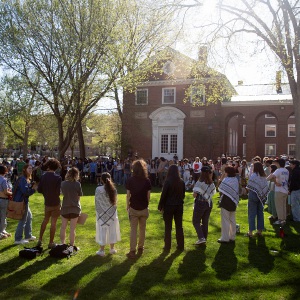 Dartmouth administration faces fierce criticism over protest arrests
Dartmouth administration faces fierce criticism over protest arrests
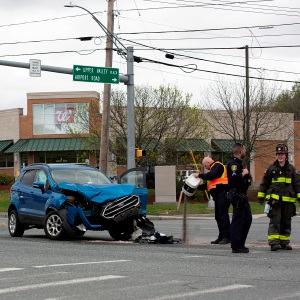 West Lebanon crash
West Lebanon crash
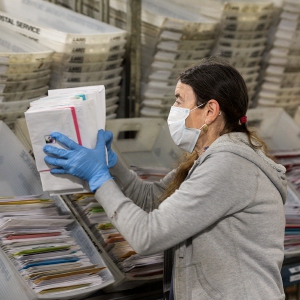 Plan on track to ship Upper Valley mail to Connecticut for sorting
Plan on track to ship Upper Valley mail to Connecticut for sorting
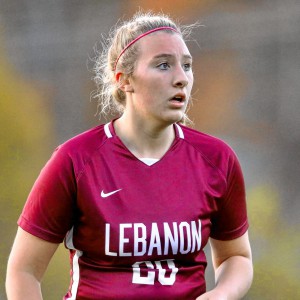 Lebanon’s Jewell back from auto accident, more aware of ‘drowsy driving’ dangers
Lebanon’s Jewell back from auto accident, more aware of ‘drowsy driving’ dangers
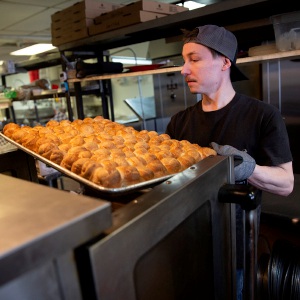 Longtime employees buy West Lebanon pizzeria
Longtime employees buy West Lebanon pizzeria
Still, we have that nettlesome pattern of unforced errors.
Both first-year presidents have sought to quash campus voices when they arguably should be encouraging them. At Barnard, the Rosenbury administration recently took down statements of support for Palestinians from the Department of Women’s, Gender and Sexuality Studies website, arguing that it was “impermissible political speech.”
The New York Times reports that about two dozen students who attended a peaceful campus protest in December have been summoned to appear before a college disciplinary committee.
The New York Civil Liberties Union has jumped into the fray, arguing that such authoritarian tactics “will inevitably serve as a license for censorship.”
At Dartmouth, as Jim Kenyon has been reporting in the Valley News, the Beilock administration decided to prosecute two students for trying to raise awareness about the war in Gaza. The students pitched a tent for six hours outside Parkhurst Hall, which houses the president’s office, and refused to leave.
Dartmouth summoned the police and had the students arrested. They now face misdemeanor charges.
These administrators should be encouraging peaceful expressions of conscience — as well as contrary views — not punishing them.
One of the classes I teach at Dartmouth is a course on the Sixties. My principal goal is to demonstrate the centrality of the humanities for understanding that transformative decade, so the course includes politics, history, music, fashion, religion, art and architecture.
My secondary purpose is to expose students to an era of campus activism, a time when students cared about matters beyond GPA, careers on Wall Street or admission to law school.
After I introduce the Free Speech movement at Berkeley, for instance, I typically pose a question for discussion: “The Free Speech Movement at the University of California, Berkeley, beginning in the fall of 1964, asserted the rights of students to protest and demonstrate on campus, a right that was affirmed by the Berkeley faculty and spread to other campuses over the course of the 1960s.
Why do you suppose so few students exercise that right in the 21st century? Why (to localize the question) is there so little student activism at a place like Dartmouth College?”
The responses are largely defensive, with some students asserting that social media posts stand in for physical protests. Many others confess they refuse to do even that, fearful that an ill-considered post might surface some day in a job interview.
Not exactly profiles in courage.
I might not agree with the campus voices at Barnard and Dartmouth, but I commend them for their courage. The presidents of both institutions should take at least a measure of pride that the education they offer encourages students to think for themselves and to stand up for their convictions. Instead, they have chosen to quash dissent.
My long ago colleague was right: Beware the unforced errors.
Randall Balmer is the John Phillips Professor in Religion at Dartmouth.

 Editorial: Response to campus protests only adds fuel to the fire
Editorial: Response to campus protests only adds fuel to the fire Editorial: Chris Sununu’s moral vacuum
Editorial: Chris Sununu’s moral vacuum Editorial: Gambling tarnishes America’s sporting life
Editorial: Gambling tarnishes America’s sporting life By the Way: A white nationalist’s many mistruths
By the Way: A white nationalist’s many mistruths
